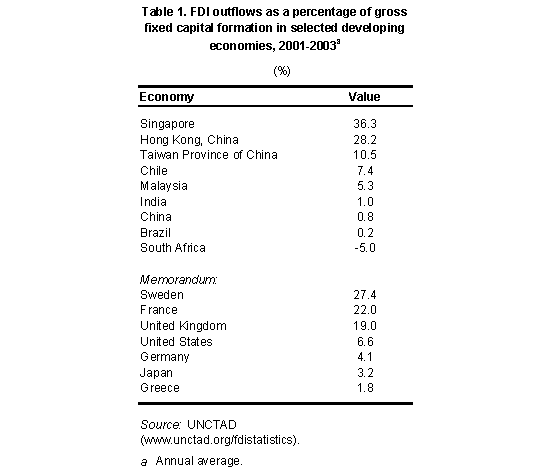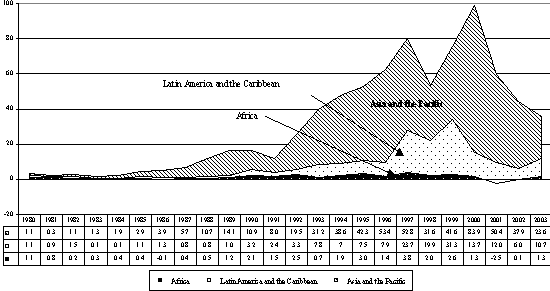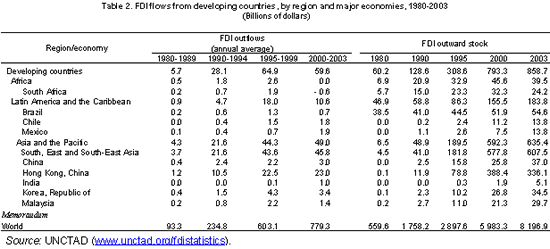There has been much talk about the emerging new geography of international trade, referring to the growing importance of developing countries in North-South trade and the rise of South-South trade as well. It seems, however, that this new trend is not confined to trade relations alone. Similar patterns are also emerging in international investment flows, suggesting the possible emergence of a new geography of international investment relations.
What is happening?
Annual foreign direct investment (FDI) outflows from developing countries have grown faster over the past 15 years than those from developed countries. Negligible until the early 1990s (figure 1), outward FDI from developing countries accounted for over one tenth of total world stock and some 6% of total world flows in 2003 ($0.9 trillion and $36 billion, respectively). FDI from developing countries to other developing countries seems to be growing faster than that from developing countries to developed countries.
Firms from some developing economies (such as Malaysia, the Republic of Korea and Singapore) already have an established track record as outward investors. Others -including Chile, Mexico and South Africa - have become players relatively recently. Still others - e.g., firms in Brazil, China and India - are about to take off
Some developing economies are now large investors, by international standards. In 2003, for instance, Hong Kong, China, had a larger outward FDI stock than Sweden - even if roundtripping and indirect FDI are taken into account. Its transnational corporations (TNCs) - along with those from Singapore, the Republic of Korea, Mexico and, more recently, South Africa - figure prominently among the developing world´s leading TNCs.
This reflects the recognition of firms from developing countries that, in a globalizing world economy, they need a portfolio of locational assets in order to be competitive internationally. Their investments span all sectors and country groups and involve complex as well as simple industries.
If FDI outflows are viewed in relation to gross fixed capital formation (table 1), a number of developing economies (Singapore; Hong Kong, China; Taiwan Province of China; and Chile) rank higher than some developed countries (Germany, Japan and the US). This suggests that a number of developing countries, relatively speaking, are already among the world´s top investors.
Not all developing regions participate equally in this emerging constellation. Asia, led by the south, east and south-east, was by far the largest outward investor in the developing world, followed by Latin America (table 2). In recent years, FDI from both Africa and Asia has been rising, while outflows from Latin America and the Caribbean have stagnated.
Third-world transnational corporations have also joined UNCTAD´s list of the world´s 100 largest TNCs. A good part of their investment is within their own regions. In particular, FDI within and between North-East and South-East Asia accounted for almost half of all investment inflows within these subregions during 2001-2002, up from 38% in 1999-2000.

Overall, however, UNCTAD is predicting that the share of developing countries in outward FDI can be expected to rise as developing-country firms become more competitive and their governments permit or even encourage outward FDI - thus further strengthening the "emerging new geography of investment".
Figure 1. FDI outflows from developing countries, by region, 1980-2003

(Billions of dollars)
Source: UNCTAD( www.unctad.org/fdistatistics).

This text was prepared in the context of the World Investment Report 2004: The Shift Towards Services, to be released 22 September 2004, 17:00 GMT. For more information, see: http://www.unctad.org/wir.


